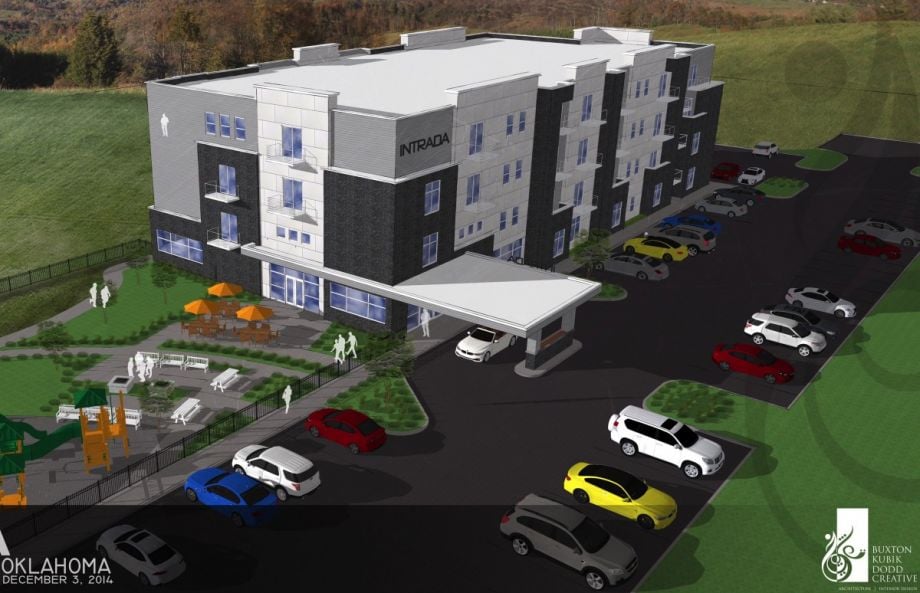Amid endless handwringing over millennials’ financial troubles and nonstop speculation about whether or not the generation will ever embrace homeownership, there are struggling, and often overlooked, 20-somethings who don’t get photographed in their $2,000-a-month rentals for the Chicago Tribune.
In fact, some of the people I’m talking about haven’t had the security of a permanent home for some time. But one Midwestern housing developer is working on a way to help them, with an approach that — fitting to cities and their mix of generations — sets aside the tired millennials vs. baby boomers rhetoric.
In Oklahoma, the Road to Independence Network found that of the 1,639 youth who exited the state’s child welfare system between 2009 and 2013 due to adulthood, 415 experienced some form of homelessness at least once.
This dilemma was concentrated in urban centers:
Findings show common themes … in Oklahoma City and Tulsa. Gaps in services included limited housing options for young people after exiting child welfare custody, inadequate independent living and transition services while in child welfare custody, unmet social and emotional needs, need for increased involvement of child welfare specialists and healthy connections with positive adults.
The Vecino Group of Springfield, a developer based in Springfield, Missouri, is proposing intergenerational housing as a long-term sustainable solution. Inspired by a similar project in Portland, Oregon, Vecino hopes to build a 60-unit affordable housing project in Tulsa, with 30 units designated for people aging out of foster care and 30 set aside for local seniors.
“Anything we do has to pass a gut check that says, ‘Is this housing for the greater good?’” says Vecino’s Heather Bradley-Geary of her company’s mission. The for-profit developer has a nationwide portfolio that includes mixed-use historic and adaptive reuse projects as well as new-construction affordable housing.
After becoming aware of the challenges these young adults in Oklahoma were facing when exiting foster care, Vecino started looking at different housing models that could help with the transition to independent living.
“Lots of youth had been in group homes over the years, and we wanted this to be different from that,” Bradley-Geary says. “We wanted an integrated approach, and we also saw the need for housing seniors [in Tulsa].”
The first intergenerational housing project of this kind was Hope Meadows in Rantoul, Illinois, which opened on a converted military base in 1994. Since then, only a handful of similar developments have popped up, but Generations of Hope Development Corp., the force behind Hope Meadows, has more projects in the works. “We’re interested in how to use this model to support vulnerable families: vets dealing with TBI, adults with developmental issues, young moms,” Mark Dunham of GHDC told Newsweek last year. “It began with foster care, but it won’t be limited, and the key factor is the presence of older Americans.”
Vecino’s Tulsa complex would include community space, a computer lab, a fitness center and on-site job training to facilitate interaction.
To apply for low-income housing tax credits from the Oklahoma Housing Finance Agency, Vecino has been working with the Midwest Housing Equity Group (MHEG), which provides technical assistance to developers, owners and managers of tax credit properties.
“Your hope is that your next door neighbor becomes your surrogate family. That would really be the hope,” says Andrea Frymire, from MHEG, of the Vecino project. “[It would] put them in a community where it’s not just 50 other kids, really getting them tied back into the larger community and having a support network.”
Vecino had a site selected for the development, which they’ve named Intrada, in south Tulsa, but a recent setback has them looking for a site closer to downtown while they put together their application for the next round of tax credits. They hope to find a spot closer to Youth Services of Tulsa, a local support organization that provides a range of housing, legal and support services to Tulsa’s young people.
“This is our first try at [intergenerational housing],” says Bradley-Geary. “But we really think it will set up a natural mentoring between Tulsa’s seniors and youth.”
The Equity Factor is made possible with the support of the Surdna Foundation.

Alexis Stephens was Next City’s 2014-2015 equitable cities fellow. She’s written about housing, pop culture, global music subcultures, and more for publications like Shelterforce, Rolling Stone, SPIN, and MTV Iggy. She has a B.A. in urban studies from Barnard College and an M.S. in historic preservation from the University of Pennsylvania.

















